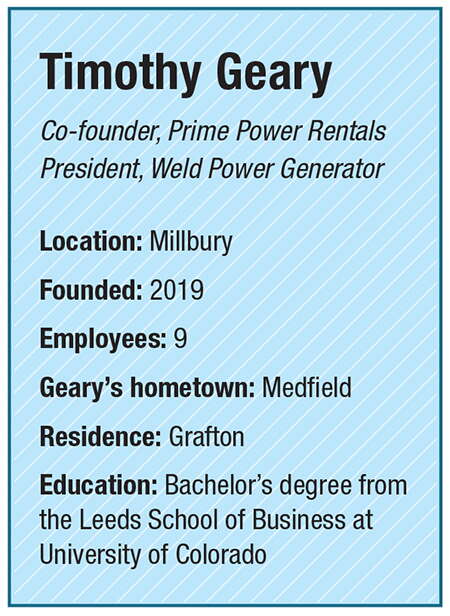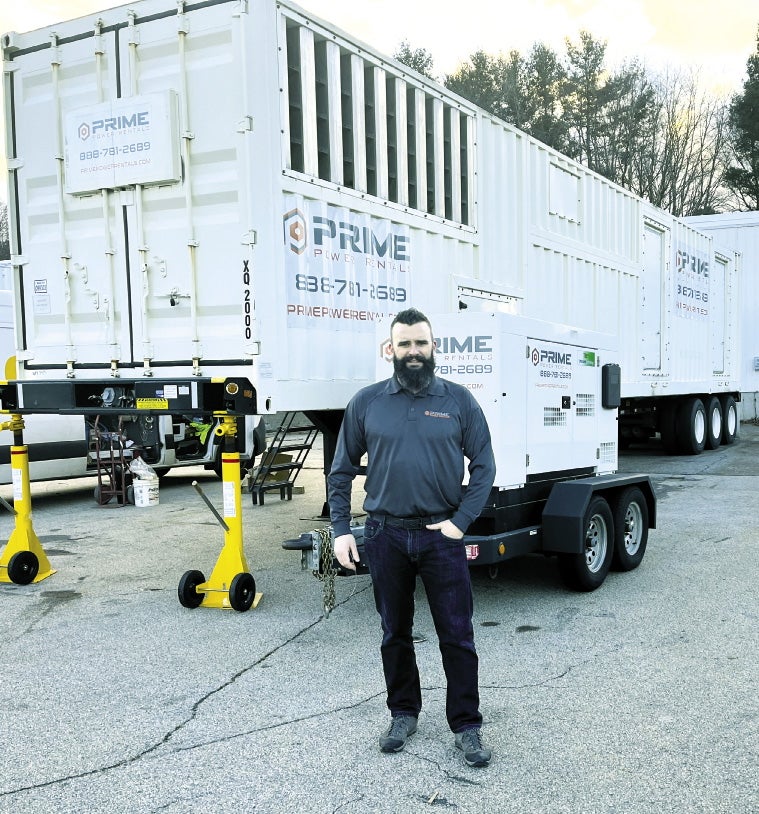
Q&A: Generating power, throughout the Northeast
 Photo | Courtesy of Prime Power Rentals
Timothy Geary, president of Weld Power Generation and co-founder of Prime Power Rentals
Photo | Courtesy of Prime Power Rentals
Timothy Geary, president of Weld Power Generation and co-founder of Prime Power Rentals
Power generation isn’t something Timothy Geary, co-founder of Prime Power Rentals in Millbury, just fell into; his father did. Geary’s dad was a business consultant and bought Weld Power Generator from a client in the 1980s without prior experience. Eventually, he’d ask his entrepreneur son to take the helm after earning his degree from the University of Colorado’s Leeds School of Business. That was back in 2008.

Geary continues to run Weld, along with his newer venture, Prime Power Rentals, with co-founder Brian Kerins. With a niche providing turnkey power generator rentals for the major utility companies in New England, Geary explained why launching Prime Power Rentals in 2019 was a sure bet in an interview with WBJ in January.
Did you always work in the family business?
Someone else ran it before me. Right out of college, I started a company called Boston Bucks. It was a meal plan for college kids in Boston.
Then my dad asked me to run Weld. In high school, I was sweeping the floors and changing oil at the company.
Your company, Prime Power Rentals, was named one of the 2023 fastest-growing U.S. companies on Inc. Magazine’s 5000 list. What’s your secret?
We knew this was a high-growth industry, with the need for rental power, especially to utility companies. It’s a very strong market to be in. Brian and I work really well together. He had a lot of people he worked with in the utility field, and my background in the generator service and sales world clicked. We hit the ground running.
The grid is overloaded. On hot days, when people are running their AC units, without these rental generators we put out, there would likely be some sort of blackout. The increase in electric vehicles is a major concern for utility companies. People are just more reliant on power than ever. To live with an extended outage is a real problem.
How do you balance leading two companies?
I spend 50% of my time on Prime and 50% on Weld, which is a separate generator service and sales company. It kind of varies by the week. It’s a lot of work, but I’m having a lot of fun growing them both.
We were on the Inc. 5000 list five times for Weld Power. We were a small Worcester-based company, and now we are in the Bronx, New York.
Speaking of locations, how did you choose Millbury as the home for both Prime and Weld?
We couldn’t find a better spot to service New England like we do. You’re an hour from Boston, an hour from Providence, and a couple hundred yards off the Mass Pike. We have offices in Western Massachusetts and New Hampshire.
What is the bulk of your Prime Power business?
Planned outages are ongoing. Some of those jobs will go on for months. The other side of the business is emergency response. If we have a storm coming, we will be completely out of equipment for the duration of that storm. If the utility company knows there’s a hospital or some important element of the grid they’re not going to be able to get online quickly, they’ll call us out.
How big is your fleet?
We have 30 generators. The smallest is 10 kilowatts, which works for a house. The largest is 2.2 megawatts, and that can power an entire hospital or a couple thousand houses.
Do other companies do what you do?
We’re different than a Sunbelt or a Hertz. You call, and they deliver the equipment.
We’re really a turnkey operation. Our employees can go out and speak the language. When we put a generator out, we have someone with it 24/7 to be sure it stays running.
Any plans to grow outside of New England?
We feel we can pick up more market share within our existing footprint. We plan to expand our geographic footprint to the New York and New Jersey markets and hit Connecticut from both sides.
This interview was conducted and edited for length and clarity by WBJ Correspondent Emily Micucci.









0 Comments